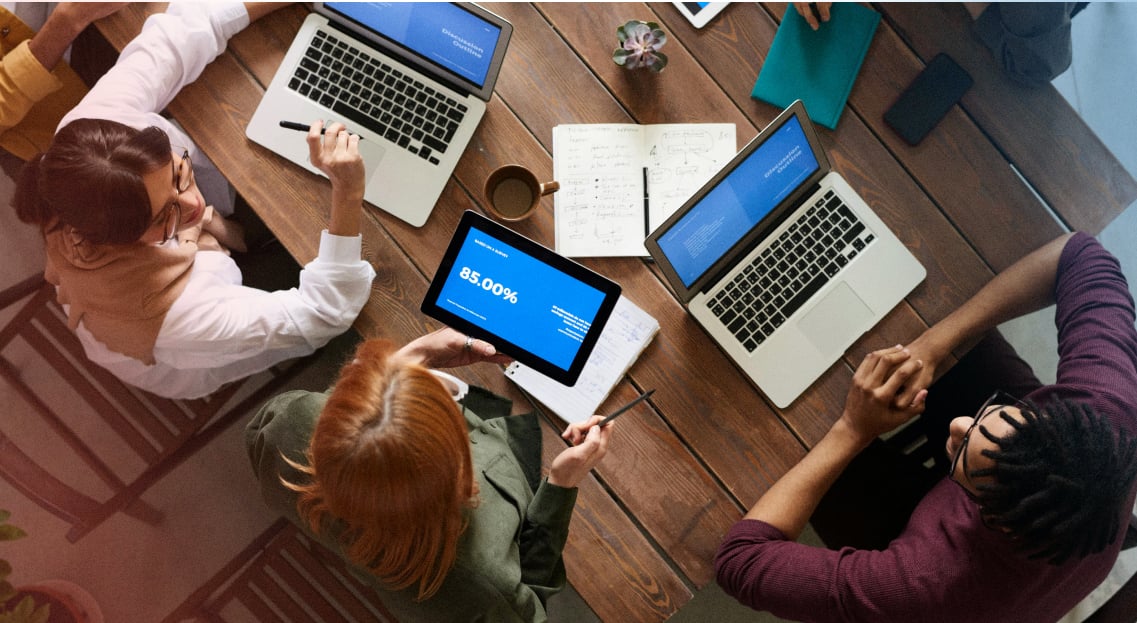Upskilling and continuous learning are the new buzzwords in business, but it goes beyond the odd course or workshop. Experts are urging leaders to start developing a sustainable learning culture in the workplace to ensure that companies remain competitive and to channel opportunities for growth, development and innovation towards employees. We look closely at the what, why and how of developing a sustainable learning culture at work.
What is a sustainable learning culture?
Workplace culture is the glue that motivates employees and drives the actions they take. Sustainable learning is when a business makes continuous employee development and education a key metric of the organisation’s culture. For employees, a sustainable learning culture leads to empowerment, job satisfaction, and career opportunities. For businesses, it means they’re able to attract and retain top talent, can more easily innovate and adapt, and will see an increase in productivity.
Those organisations already committed to sustainable learning are reaping the benefits, while those that don’t lag behind. According to a survey by IBM, among top-performing companies, up to 84% of employees are receiving regular training. Contrast that with poorly-performing companies where only 16% of employees receive ongoing education.
IBM also found that up to 80% of business leaders believe effective training is essential to the success of projects and can result in a 10% increase in productivity. Sustainable learning is especially important in tech and financial institutions, where digital transformation is advancing at warp speed. Vodafone and Deutsche Bank, for example, have already institutionalised a sustainable learning culture in their workplaces to stay ahead of the game.
Soft skills as the groundwork for sustainable learning
Just three years ago, hard skills – those that qualify you to master the practicalities of your job – were at the top of recruiters’ wish lists. Fast forward to today, and, according to Linkedin talent research, more than 50% of the skills required in job listings are soft (power) skills – leadership, empathy, teamwork, critical thinking and communication, etc.
While people naturally would have some of the top ten power skills needed to succeed in business today, few of us have enough to them to add them to our CV and be competitive. But they can be learnt. These soft skills are the key to acquiring new hard skills and are prerequisites in modern workplaces exposed to technological advancements, digitalisation, and increased work demands.
Sustainable learning and the modern workforce
Sustainable learning is essential for employees to maintain relevant skills as the world of work changes. Deloitte’s 2021 Human Capital Trends report shows that companies that give their employees the choice to explore their passions and learn new things will be in a better position to activate these employees around emerging business priorities.
One way to give workers more agency – the capacity to have the power and resources to fulfil their potential – is by giving them access to educational platforms that provide defined opportunities for professional development, training, project participation, mentorship, promotion, networking, diversity, and inclusion.
Deloitte’s findings show that the role of the employer as an educator will become even more important in the future as they provide timely, relevant, and targeted lifelong learning opportunities.
7 Ways to create a sustainable learning culture in the workplace
Cameron Elliot, a certified organisational coach who specialises in aligning businesses’ revenue generation goals with those tasked with achieving them, highlights seven strategies that can help build a sustainable learning culture at all businesses.
- Prioritise learning – Offer learning opportunities at onboarding and on an ongoing basis. Combine structured learning programmes with supportive coaching.
- Align business goals to learning opportunities – When you connect learning outcomes to the business strategy, your programme objectives focus on success and performance outcomes – essentially, what leaders are already measured on.
- Lead by example – Leaders should participate in training, direct training, and invest in upskilling themselves. This is beneficial on a personal level and to the business itself while clearly indicating your priorities to your employees.
- Block out time to learn or train – Training courses can take anything from a few weeks to a couple of months. By scheduling training in advance and setting time aside for team members to participate when it suits them, nobody falls through the cracks.
- Establish training goals – Determining set outcomes reinforces good behaviour, especially when learning new skills. It will also emphasise why the training is so important.
- Prioritise real-world learning – Ignore courses that spend hours on business philosophy lessons and focus on career-focused education and practical learning. Employees need to be able to apply what they’ve learnt the minute they step back into the office.
- Offer rewards for learning – Celebrate achievements when employees apply what they learnt in the workplace and recognise milestones. This keeps employees engaged.
With the longevity of skills shrinking and the cycle of unlearning and relearning in full motion, creating a sustainable learning culture should be a top priority for business teams going into 2023.
MasterStart offers practical and relevant business-orientated short and online courses that provide transformational learning experiences for future-ready leaders. From business development, leadership, risk management, and data analysis, there’s a course for every key employee in your organisation. Contact us today to discuss your sustainable learning strategies for the coming year.


